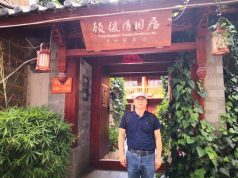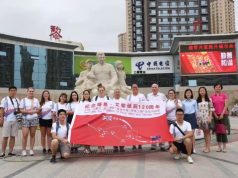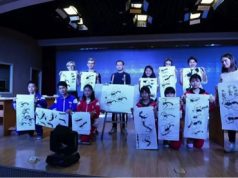Successful applicants for the NZCFS Youth Friendship Ambassadorships for 2014, are Deborah Robertson, Toby Jordan and Parley Reynolds. Each has submitted a fascinating project for their time in China.
Funded by the NZCFS Simon Deng Li Fund, these three young people will set off soon to China to find out:
- The possibilities of protecting threatened mangrove forests (Deborah’s project)
- Organising a think tank for Millennials [Generation Y age group – see below for an explanation!!] (Toby Jordan), and
- Discovering the possibilities of developing a building material made from hemp (Parley Reynolds).
The Simon Deng Li Fund has provided the finance for these three projects and covers air fares, visa costs, insurance, travel requirements in China, daily expenses and possible interpreters. The Youth Friendship Ambassadorship is open to young people aged up to 30 in which they were asked to design a project of their own either participating in a voluntary community project, establishing youth partnerships in China or proposing a specific cultural learning or other educational topic. The winning three presented interesting projects, each of which satisfied these criteria, with a time frame of around 6 – 8 weeks (and can be realised within the budget).

Deborah’s project is concentrated on China’s mangrove forests, their value to local communities, their uses and conservation. They are important ecosystems protecting coral reefs and sea grasses, providing storm protection, and support unique biological diversity.
She writes:-
“In 2006, a working group of international mangrove experts concurred that we face the global prospect of mangrove forests being lost within the next 50 – 100 years. This loss is significant in China, with 70% of mangrove forest lost in the past 50 years.
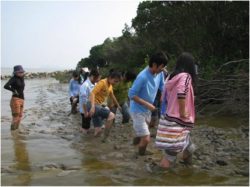
“New Zealand is dealing with the unique phenomenon of rapidly spreading mangroves and what to do about them…but there are still conservation challenges. Despite our ‘clean and green’ reputation, we are in danger of being the next country after China to have an aquatic mammal become extinct if significant changes are not made (that is the Maui’s dolphin after the Yangtze River dolphin). Unlike New Zealand, internationally China does not have a positive environmental reputation, but positive environmental initiatives are being locally led and promoted with success in China. I feel generally, New Zealanders are not aware of the wide range of values that Chinese hold.
“Finally, biodiversity is a global issue and marine ecosystems are inter-connected. Both China and New Zealand’s coastal habitats are part of the East-Asian – Australasian Flyway, which is extremely important for millions of migratory waders or shorebirds.”
It is Deborah’s hope that friendships will be formed on the basis of these connections and shared passion for the marine environment, and that both countries will benefit from the shared knowledge and partnership of this process.
Deborah has chosen three in-China partners to assist her in implementing the project. These are located in Fujian Province, Guangdong Province and Hong Kong. She will depart New Zealand to begin her project on 27th June and stay for six weeks.
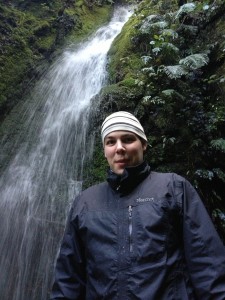
Toby Jordan has a completely different project in mind for his journey to China. The title is ‘Global Youth Think Tank, China Engagement Project. Toby intends to use his time in China to include ‘millennials’ (18-30 year-olds) in the development of a youth-led global think tank, ‘International Connector – Millennial Catalysts‘ with which he is already involved. The think tank was launched in January and young people from around 20 diverse areas of the world are involved in comparing and contrasting youth opinions across the world. However, China has not yet established any ‘millennials’ groups able to build relationships with other countries. This will be Toby’s intention.
He states that:…
“Chinese ‘millennials’ comprise an extremely important group who are thinking and acting very differently to previous generations. They are the first group to grow up after major reforms were enacted and have never experienced the hardships endured by their parents, including civil war, invasion and food struggles. I am determined to seek out and consult Chinese ‘millennials’ for the think tank and am especially passionate about understanding the differences between those ‘millennials’ in large cities like Beijing and Shanghai and those who live in smaller areas with a strong ethnic minority base.”
His objectives are to create strong ongoing relationships between China, NZ and the global community, to bring them together to achieve a better understanding through friendship. Also he would like to foster strong connections between ‘millennial’ of ethnic minorities in China and New Zealand and provide a voice for Chinese ‘millennials’ globally through the youth-led think tank. He intends to develop a deeper understanding of Chinese culture, politics systems and practices and share his experiences with others back home in New Zealand and around the world.
Toby is recognised in New Zealand as a youth leader and so hopes to create strong connections between the youth of New Zealand and China. He will travel to Beijing, Shanghai and Hohhot (in Inner Mongolia). He intends to enlarge on his knowledge of Mandarin before he leaves and already has a long list of names of people he wishes to contact in each of the three areas proposed.
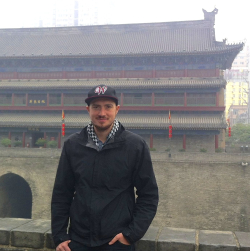
The third successful applicant is Parley Reynolds whose special interest is in hemp as a building material. The project will take place in Shandan County, Gansu Province as a collaboration between our own Shandan Bailie School and the Western China Co-operative Training Centre. Parley states that between 5 and 10% of carbon emissions in China are created from cement production. He intends this project to pilot a method of creating a clean, green alternative, which will also provide jobs and income for farmers [Click here for a 2-minute introduction to the advantages of hemp as a building material, on Youtube]. Farmers will be shown how to grow industrial hemp and process the plant to be used together with lime and water to become a cheap lightweight, high-strength building alternative to concrete. Presently hemp grows in Shandan as a common weed and China is currently the largest producer of hemp in the world, with Shandan having a history of processing hemp fibre in the area. However, the traditional process, which involves soaking the plant in water, ruins the woody core making it impossible to use as a building material.
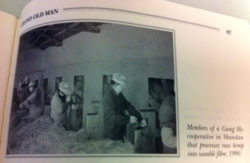
Parley intends to help train the farmers in a method of drying the hemp in the sun to remove fibre whilst retaining the woody core. The farmers will then learn how to process the dried stalks, creating a high-value product, which can be produced locally at very low cost, and save precious water into the bargain.
He says that it will create a potential business opportunity to aid poverty alleviation, will create jobs and higher income and after a training seminar, will provide the skills to create a valuable, locally grown, product. His time frame will be March to April, 2014.
All of the above projects should contribute to greater communication and friendship between our two countries.
The three applicants provided complete details of their projects and the benefits that will be gained from their hard work. The Society wishes them good luck in their endeavours.
We look forward to reporting on their projects after their return.
Teri France, March 2014


